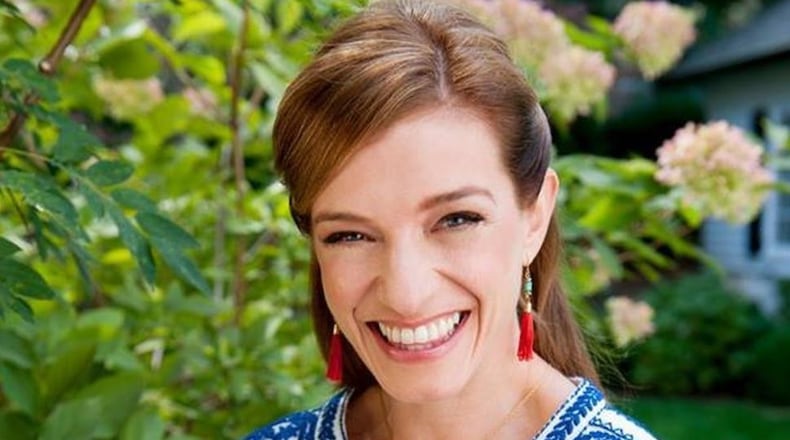Pati Jinich, cookbook author and host of PBS cooking show "Pati's Mexican Table," was born and raised in Mexico City, Mexico. That upbringing informs her work as a culinarian, but so, too, does her Jewish heritage.
On Nov. 16, Jinich will be in Atlanta to participate in a dinner that celebrates Jewish-Mexican cuisine. The event, presented by the World Affairs Council, will take place at the General Muir, with food prepared by the restaurant's co-owner and executive chef Todd Ginsberg.
At the event, Jinich will discuss how her Jewish heritage, and the larger Jewish narrative in Mexico, is one of a number of elements that provide a lens for her approach to Mexican cooking.
“Jewish people have been a part of Mexico for centuries, since the Spanish came to Mexico. There were some Marranos on those boats,” she said, referencing Jews who arrived during the Spanish conquest of the early 1500s.
Jinich’s own grandparents were among the waves of Jews who immigrated to Mexico during the 20th century. Her paternal grandparents arrived from Poland, separately, in the 1920s and early ’30s. Her maternal grandparents both fled to escape Nazi persecution during World War II. They met and married in Mexico.
She noted that the present-day Jewish population in Mexico is “very complex,” a mix of people whose roots span the globe.
While Jinich deems that “there is something that we can call Mexican-Jewish cuisine,” she also sees that fusion as something that is hardly static. Like all cuisines, “it keeps growing and evolving.” But, she noted, “There are dishes that have been passed down for generations.”
One of those is gefilte fish. In traditional Ashkenazi Jewish households, this appetizer of poached ground fish would be served cold. However, Ashkenazi Jews who stepped off the boat at the Port of Veracruz were greeted with ingredients like chiles and Roma tomatoes that could be used to cook up a heady sauce. Thus, gefilte fish in Mexico is “very similar to Veracruz-style fish,” said Jinich of the dish, which is among those that will be served at the General Muir dinner. “Instead of being served cold, it’s served hot with a really tasty sauce, and poached and packed with flavor.”
Other dishes slated for the Nov. 16 event include Piloncillo Brisket, a recipe that embraces pasilla chiles, tomatillos and piloncillo, an unrefined, pure cane sugar commonly used in Mexican kitchens. “It’s definitely a Mexican take on a brisket,” she said.
Also in the meal lineup is Jinich’s grandmother’s recipe for matzo ball soup, which makes use of nutmeg and parsley. Jinich gave it a touch of her own personality by adding sesame oil. “It’s a very nutty, fluffy matzo ball that has a toasted bread taste because of the sesame seed oil and nutmeg. You eat it with the chicken broth, with mushrooms steamed with jalapeno, onion and cilantro.” The recipe is included in Jinich’s cookbook, “Mexican Today: New and Rediscovered Recipes for Contemporary Kitchens,” published in 2016.
Jinich has brought Mexican cuisine to the eyes of U.S. home cooks not just through her cookbooks, but through her PBS cooking and travelogue show, “Pati’s Mexican Table,” now in its sixth season.
“Every season, we go to a different region of Mexico. We go to the field, where cameras haven’t gone, and then show what you can do to bring these flavors to your kitchen to enrich your weekly menu.”
She can be counted among a heady roll call of cookbook authors and chefs who have made Mexican cuisine accessible to English-speaking home cooks in the past decades.
“I see myself as very different, but I see all of us together as complementary,” she replied when asked how she views herself compared to names like Diana Kennedy and Rick Bayless, who have introduced cookbook consumers and cooking show aficionados to Mexican cuisine. “The more the merrier. There is room for everybody.”
“Diana Kennedy has been extraordinary for Mexican cuisine. It took a British woman to say, ‘Look what you have!’ She is a traditionalist, a chronologist. She is about passing things on exactly as they are. She is on the spectrum that is ‘preserve’ — this is how it’s done.”
Jinich regards Bayless as one who enters the arena with the eye of a chef who “is there to help you explore.”
She considers her approach as highly accessible. “You can make everything in your home kitchen. If you can’t find this leaf, substitute something else. I’m telling you: It’s easy,” said the working mother who has lived in the U.S. since the late 1990s and resides in the Washington, D.C., Beltway. “I try to pass on the foods that I grew up eating, and that I love. I hunt for homestyle, the wider range of Mexican cooking that Mexicans really eat at home.”
Currently, what excites Jinich is seeing and participating in a reinterpretation of traditional Mexican dishes. “There has been a revolution in Mexican cuisine in the last 20 years. It used to be mostly women in the kitchen. Then, young men started getting into the kitchen, pushing limits, using new techniques. We can reinterpret what has been passed on to us and create new traditions. We can appreciate traditional dishes that respect their souls and ingredients, while still using modern equipment and tools.”
EVENT PREVIEW
Pati Jinich dinner and book signing
7 p.m. Nov 16. $60 per person. Includes copy of "Mexican Today." The General Muir, 1540 Avenue Place, Atlanta. Purchase tickets at wacatlanta.org.
About the Author
The Latest
Featured




